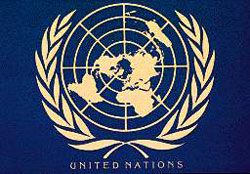 BEIRUT, 30 March (IRIN) – A UN Security Council (UNSC) decision authorising UN Secretary-General Kofi Annan to hold negotiations with Beirut on the establishment of a tribunal to try suspects in the murder of former Lebanese Prime Minister Rafik Hariri received positive reactions among some circles. "This is a positive step towards revealing the truth behind Hariri’s death," said Michael Young, a Beirut-based political analyst.
BEIRUT, 30 March (IRIN) – A UN Security Council (UNSC) decision authorising UN Secretary-General Kofi Annan to hold negotiations with Beirut on the establishment of a tribunal to try suspects in the murder of former Lebanese Prime Minister Rafik Hariri received positive reactions among some circles. "This is a positive step towards revealing the truth behind Hariri’s death," said Michael Young, a Beirut-based political analyst.
Resolution 1664, unanimously adopted by the 15-member council on Wednesday, called for Annan to begin talks with the government "aimed at establishing a tribunal of an international character based on the highest international standards of criminal justice". "The resolution is basically an agreement to push the process forward," said Young. "It opened the door for negotiations between the two concerned parties: the UN and the Lebanese government." Foreign Ministry Secretary-General Butros Assaker welcomed the decision, saying that the government, "would do its best to conclude the negotiations with Annan without delay." He went on to say that the resolution gave voice to the international community’s decision to support Lebanon and punish the perpetrators of the February 2005 Hariri assassination.
"This decision will help enhance stability in Lebanon," Assaker added. "It’s a clear message for terrorists threatening the country that Lebanon is off limits."
The resolution comes after a preliminary, 22 March report to the Security Council, in which Annan recommended the creation of a mixed tribunal, consisting of both Lebanese and international participants. The resolution stipulates that Annan regularly report on the progress of the talks and consider "options for a funding mechanism appropriate to ensure the continued and effective functioning of the tribunal".
A UN probe into the assassination is ongoing, with current head investigator Serge Brammertz saying in his most recent report that he expects "Syria to show more cooperation" with the inquiry.
German investigator Detlev Mehlis, who headed the UN investigation until December 2005, released two reports last year stating that the killing could not have been carried out "without the approval of top-ranked Syrian security officials", working with their Lebanese counterparts. Syrian officials, however, have steadfastly denied involvement.

admin
 BEIRUT, 30 March (IRIN) – A UN Security Council (UNSC) decision authorising UN Secretary-General Kofi Annan to hold negotiations with Beirut on the establishment of a tribunal to try suspects in the murder of former Lebanese Prime Minister Rafik Hariri received positive reactions among some circles. "This is a positive step towards revealing the truth behind Hariri’s death," said Michael Young, a Beirut-based political analyst.
BEIRUT, 30 March (IRIN) – A UN Security Council (UNSC) decision authorising UN Secretary-General Kofi Annan to hold negotiations with Beirut on the establishment of a tribunal to try suspects in the murder of former Lebanese Prime Minister Rafik Hariri received positive reactions among some circles. "This is a positive step towards revealing the truth behind Hariri’s death," said Michael Young, a Beirut-based political analyst. 


